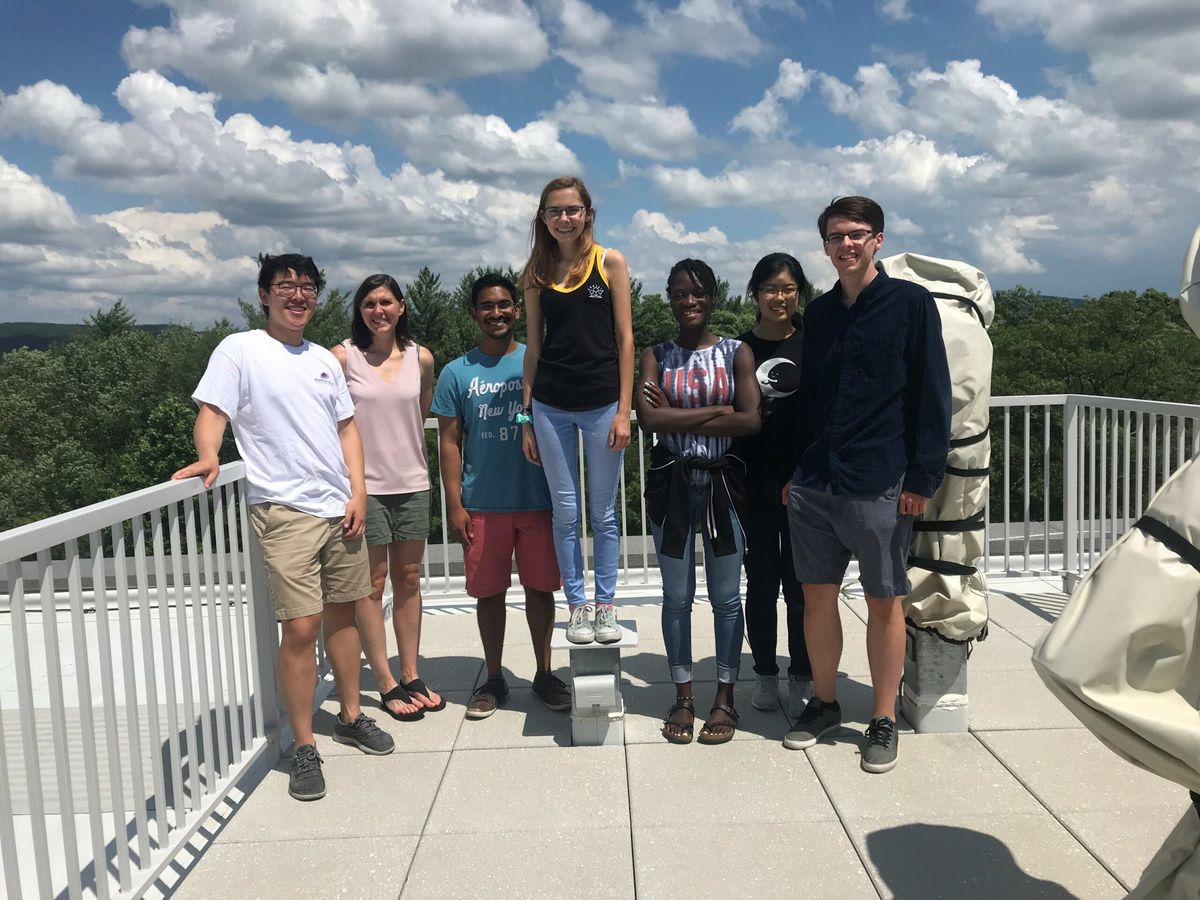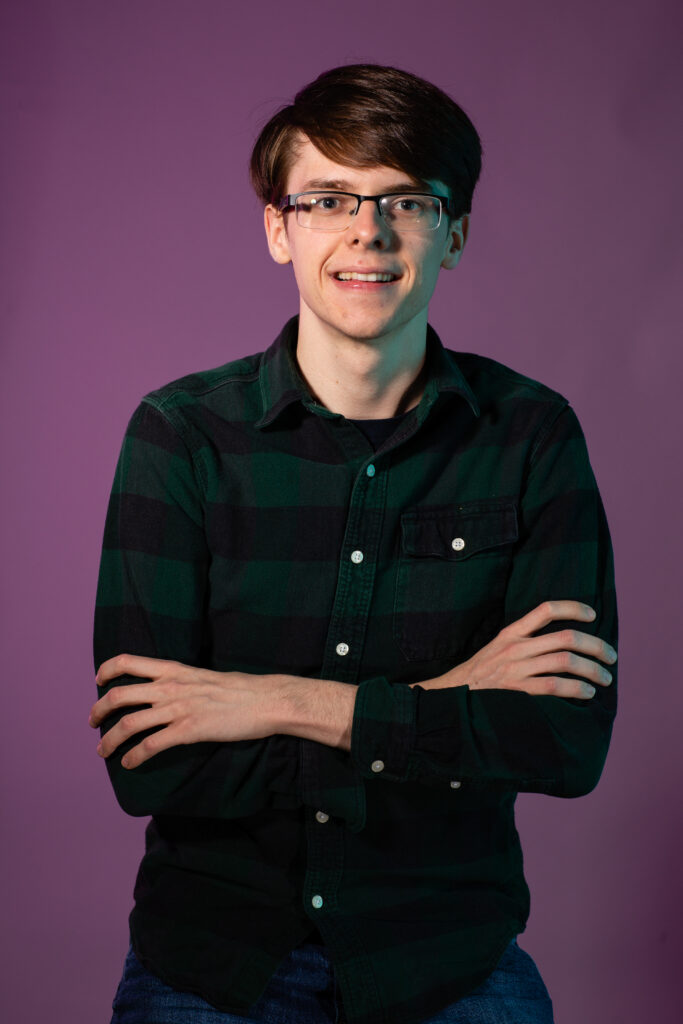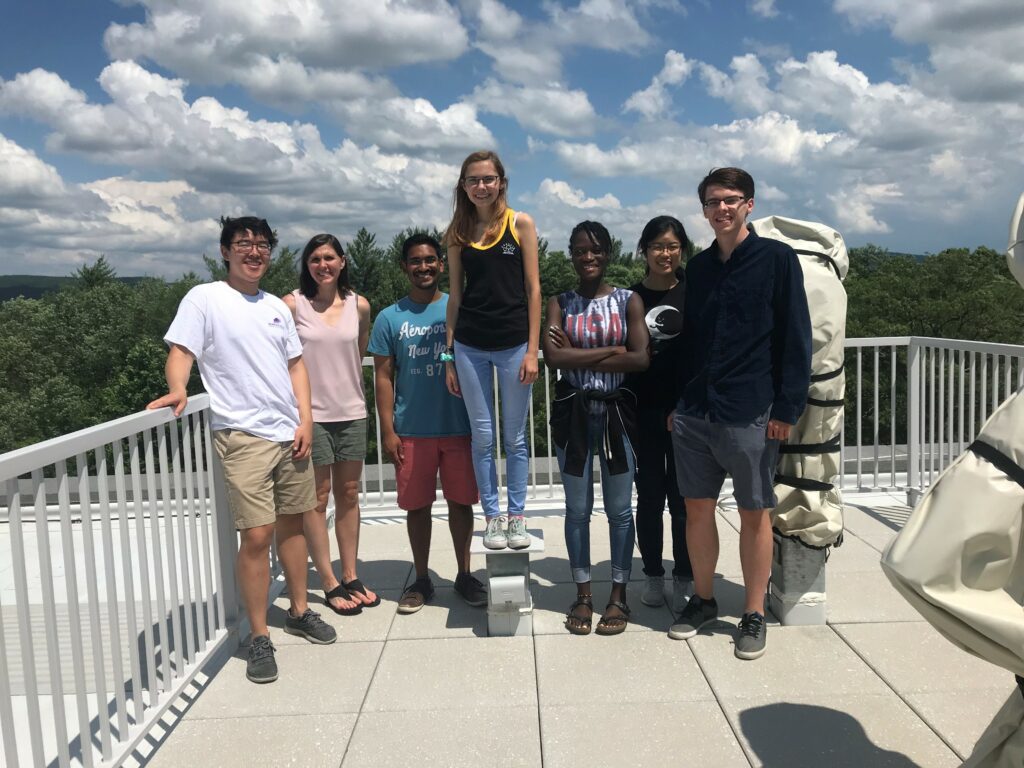Ryan McMillan: Trying and Failing Upwards, A Biophysicist’s Journey


Ryan McMillan ’20 is not a loud person. Ask him, and he’ll tell you that he has, for most of his life, been varying degrees of timid, even if he’s eased into a slightly bolder attitude. Luckily, McMillan doesn’t need to be loud to exercise the type of quiet empathy that he’s become known for on campus, nor does he need it to advance the groundbreaking biophysical research that he’s received accolades upon accolades for — among them a Goldwater Scholarship, a Fulbright Scholarship and a National Science Foundation (NSF) graduate fellowship — over the past four years.
What he does need is what he already has: the unbridled passion of a young scientist, a constant concern for others and, above all, the determination to keep trying that marks an exceptional student. It’s with these traits that McMillan graduates Amherst and begins a new journey of scientific inquiry but not without a deep fondness for the path that led him here.
A Limited Upbringing
McMillan grew up in what he described as “a sort of sheltered [and] homogenous environment.” More precisely, he grew up in Charlotte, North Carolina, where he was born and lived his entire life before coming to Amherst. Accordingly, his upbringing was rather uneventful, in part due to his “really timid” attitude as a child and throughout high school, which, according to him, limited his interactions with others at a young age.
Nevertheless, McMillan was able to find a place of his own in the Boy Scouts, where he made some of his closest friends and eventually made his way to becoming an Eagle Scout. When he entered Providence High School, the local public high school, he found another outlet in the school’s German department, immersing himself in exchange programs and German literature. In particular, he could often be found reading from “a collection of [German] fairy tales” and working through its comprehension exercises as he slowly built his understanding of the language.
However, his main academic interest in high school wasn’t German but instead biology, a curiosity that he credits as having developed due to early and frequent exposure to the subject. When choosing where to attend college, McMillan was fairly insistent on majoring in biology, although that didn’t factor too much into his overall decision.
A significant factor when deciding between his three top choices — Amherst, Duke and the University of North Carolina at Chapel Hill (UNC) — was his desire to “get away from North Carolina for a bit,” especially given how many of his classmates matriculated to either Duke or UNC. That, combined with a particularly warm welcome at Amherst’s admitted student open house, led him to move almost a thousand miles to the north, landing in the colder reaches of Massachusetts.
Settling Into Amherst
Like many students, McMillan did not feel immediately comfortable upon coming to Amherst, feeling intimidated by the accomplishments of his peers, which he felt far exceeded his own. However, as he became familiar with his classes and began interacting more personally with his classmates, his “imposter syndrome” gradually subsided.
“It took until the first round of midterms for me to feel like Amherst was tough, but that it was something that I could do, that I wasn’t completely out of my league,” he noted.
Participating in clubs on campus also helped ease McMillan into life at Amherst, with the fencing club and the Kidney Disease Screening and Awareness Program (KDSAP) providing a sturdy foundation for him in his four years at the college. The former appealed to McMillan for the sense of community that it offered, whereas the latter allowed him to explore the world of health care and apply his knowledge in biology in a concrete way.
“I never really liked the competitive aspects of fencing,” McMillan admitted. “Fencing competitions encourage people to be very self-centered and chest-thumping … and that was never something that I wanted to be involved in. But I really enjoyed the team-building aspects of fencing, especially with the members of my squad.”
This aversion to competition was something that McMillan noticed as distinct about Amherst more generally, too, along with the college’s diversity relative to his hometown. “I didn’t really hear people talk about their grades, or at least not in the same depth as they did in high school, where it felt like people were competing with each other to have the best GPA,” said McMillan. “It was actually hard for me to break out of at first, because coming in, I still had this mindset that I had to be competitive in classes.”
Ultimately, McMillan came to take this value of cooperation over competition as a key lesson from his time in college, paired with a newfound appreciation for exploring beyond his typical boundaries, academic or otherwise.
From Biology to Physics to Biophysics
As for McMillan’s academic interests, his desire to study biology carried into his coursework early in his college career. However, after finishing his multivariable calculus course at the end of his first semester, he “realized that [he] wanted some sort of quantitative background to ground biology.”
As he started looking for ways to integrate a more quantitative approach into biology, he came upon two possible pathways: computational biology and biophysics.
It was only upon speaking with Professor of Physics Ashley Carter, who would turn out to be McMillan’s most significant mentor during his time at Amherst, that he realized that biophysics was the path that suited him best. Consequently, McMillan not only started taking more physics courses, but also started working in Carter’s lab, where he’s been continuously assisting in research since the interterm of his first year.
Recalling his growth as a scientist, he pointed to a period in the summer after his first year, when he was attempting to develop a set of assays to directly image DNA for Carter, as an especially significant point in convincing him to continue with research and instilling in him the importance of failure in science. He and another student had worked for over a month without producing any meaningful results, and their deadline — when they were supposed to put the assays to use — was fast approaching.
On the day before their deadline, they still hadn’t made any progress and so McMillan tried a “Hail Mary,” where he “stayed in the lab later than [he] would care to admit” in an attempt to figure something out — and miraculously, “the next day, there was something on the slide that looked somewhat promising.”
“The nice thing about research is that nothing ever works, so when something does work, it’s very exciting,” he said. “Finally getting to see that work pay off after like a month of trying was really rewarding for me and was something that, I think, encouraged me to keep going in research.”
With his classes, however, he found himself in a bit of a dilemma, as he was increasingly drawn to physics as opposed to biology or chemistry. At the end of his sophomore fall, after some deliberation with Sai Chauhan ’20, his best friend who also happened be making a similar decision, McMillan and Chauhan chose to simultaneously switch their focuses to physics as a major, even though McMillan would ultimately finish the biochemistry-biophysics (BCBP) major.

A Precocious Researcher
By the end of his sophomore year, McMillan was starting to get recognized for his research. For the summer before his junior year, he was granted a fellowship to conduct research in Saarbrücken, Germany, marrying his passion for science with his long-standing linguistic interests. There, despite having trouble with the “culture shock” and the task of speaking only in German, he confirmed that scientific research was what he wanted to do professionally, having had positive experiences in two labs by then.
It was near the end of his junior year when McMillan received the prize that would perhaps mark his college career: the Goldwater Scholarship, which provides $7,500 in funding for exceptional student scientists, mathematicians and engineers and is considered the most prestigious undergraduate scholarship in those fields.
If you bring it up with him, however, he’ll be quite humble, insisting that he was “lucky” to get the scholarship by pointing to the hundred-or-so additional awards granted in his year due to additional support from the government.
Matthew Yarnall ’20, a close friend of McMillan’s who also applied for the Goldwater Scholarship, noted his humility and compassion when the results of the prize were announced. “The minute the grant information was released in mid-March, and it turned out he won the grant and not me, his first action was to send me a text telling me what an intelligent scientist I was and that he was sure I would win some other grand [award] soon,” Yarnall said. “Ryan is eager to celebrate the success of others, but not often his own.”
“Despite the magnitude of his achievements, over the past four years, Ryan has remained one of the most grounded and sincere people I know. He has provided me, and the rest of his friends, with a reliable source of support, academic and emotional,” Chauhan added. “While he did bully me mercilessly over our journey through the physics major (all in jest!), I don’t think anyone doubted his integrity or kindness for a minute. He’s one of the best people I know, and honestly, his humility infuriates me.”
From Graduation and Onwards
The recognition didn’t abate in his senior year either. While hard at work on his thesis — a culmination of his research in the Carter lab, investigating how DNA compacts information in spaces as small as a sperm cell, through an analysis of a protein called protamine and the geometry of DNA when interacting with it — McMillan received a number of acceptances to graduate programs, including to a doctorate program at Harvard in biophysics, which he will be attending starting the fall of 2021. More, to fund his Ph.D., he applied for and received a NSF graduate fellowship, which is particularly extraordinary considering that McMillan is not yet in graduate school.
As the coronavirus pandemic swept up the end of his senior year, he took that in stride, too. McMillan used the abrupt end as an opportunity to take a breather from his thesis, to reconnect with the Amherst community one last time and to speedrun the remaining items on his college bucket list with his friends.
“Right after the email that told us to leave campus came, there was a palpable change in the atmosphere on campus. The Amherst Awkward disappeared — for the first time since orientation week, I could eat meals with people I’d never met before,” McMillan wrote in his thesis acknowledgments. “Our senior year may not have gone at all the way we’d imagined, but I’m so proud of the way we came together to make our last week of college special nonetheless.”
McMillan intends to be back in Amherst this coming fall, however, finishing up some remaining work with the Carter lab. After that, he’ll be off to Munich, Germany, conducting research funded by a Fulbright grant, where he will continue his analysis of protamine and examine its potential for nanoengineering applications.
When he gets to Harvard for his Ph.D., he hopes to be able to explore beyond his intellectual comfort zones, just like he did at Amherst. Eventually, he would like to end up in a role like Carter or his other professors: a mentor to aspiring young scientists like he was just a few years ago. Until then, he’ll have all the time in the world to continue the research he loves, in areas that he’ll surely make big strides in — even if he won’t characterize it like that himself.





Comments ()